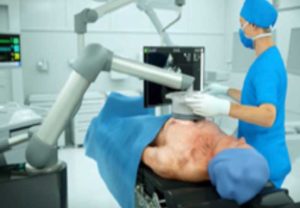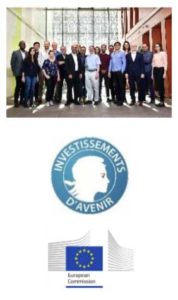

It is a world premiere: French MedTech Cardiawave has successfully treated patients suffering from calcific aortic stenosis with non-invasive therapeutic ultrasound.
Paris, November 4, 2019
After receiving authorization last spring to begin the first round of clinical trials with its Valvosoft device for the non-invasive treatment of calcific aortic stenosis, a fatal disease of the heart valves, Cardiawave announces the completion of its first international trial in ten patients. This trial was conducted at the Georges Pompidou European Hospital (HEGP, AP-HP) in Paris, France and at the Amphia Hospital in Breda, Netherlands. The post-procedural echocardiographic results were presented at the last TCT1 conference in the United States. Further results will be reported by Prof. Emmanuel Messas, co-founder of Cardiawave, cardiologist at HEGP and principal investigator, at the AHA2 conference on November 16, 2019.
Clinical trials to validate Cardiawave’s innovative medical technology (known as the Valvosoft device) were conducted as part of an international multicenter study which enrolled 10 patients: 5 in France and 5 in The Netherlands. These patients were not eligible for percutaneous aortic valve replacement (TAVR) nor for open-heart surgery, mainly due to the presence of concomitant diseases or due to difficulties in accessing the blood vessels with a catheter. Therefore, like 16%3 of people affected by severe aortic valve calcification (1.3 million people in Europe), they were left with no alternative treatment.
The mechanism of this groundbreaking technology developed by Cardiawave consists in widening the opening of the aortic valve by delivering short sequences of high-intensity ultrasounds, focused directly onto the valve from outside the body, thus eliminating the need for invasive treatment.
Analysis of the post-operative echocardiographic data, performed by an independent centralized laboratory, and of the clinical results at 30 days, confirms that the primary objectives, which were to assess safety and feasibility of this procedure, have been met.

“No death, nor stroke, heart attack, valve leakage or any adverse events related to the procedure after 30 days. These results are very promising” stated Dr. René Spaargaren, Chief Medical Officer at Cardiawave, he added: “Our main goal was to confirm the feasibility and safety of the treatment. The patients treated in the study suffered from very severe aortic stenosis and had serious co-morbidities: 70% had heart failure, 50% chronic kidney failure and 50% coronary heart diseases.”
Apart from the fact that 30 days after treatment, no adverse events related to the Valvosoft device or procedure were reported, results have also shown that none of the patients encountered neurological issues, and the majority improved their NYHA4 class. Based on the echocardiographic results from the day after the procedure, we noted an improvement in the hemodynamic parameters of some patients.
Calcific aortic stenosis affects 10 million people in Europe and the United States. Symptoms include shortness of breath, angina pectoris and fainting. There are currently only two treatment options available: percutaneous implantation of a new aortic valve (Transcatheter Aortic Valve Replacement – TAVR, invented by Professor Alain Cribier), and open-heart surgery to replace the aortic valve. However, these therapeutic approaches are not suitable for all patients. Although TAVR has made it possible to treat patients not eligible for open-heart surgery, not all of them qualify for it because of the risks associated with the procedure in elderly patients with co- morbidities. In Europe, more than 30,000 people remain symptomatic with limited physical abilities and at risk of sudden death. The new therapy developed by Cardiawave would represent a major therapeutic opportunity for them, given the absence of other current solutions.
Having completed the first stage of clinical development, a second trial in 10 patients will be conducted in collaboration with the Belgrade University Hospital Center (Serbia) in early 2020. The aim of this trial is to further confirm the safety of the treatment.
A more extensive study has already been scheduled for the end of 2020, as part of the process to obtain the CE marking and enter the European market.
Benjamin Bertrand, CEO of Cardiawave concluded: “The success of our first safety and feasibility study is a key step in the development of our company. It rewards the commitment of our teams and partners, especially the HEGP (AP-HP), the Physics for Medicine research facilities (INSERM/CNRS/ ESPCI/PSL) and the Langevin Institute (CNRS/ESPCI). The therapy that we have developed opens up new possibilities for patients who are currently awaiting treatment. In the future, we may be able to offer them a non-invasive, ambulatory treatment for a deadly disease that is affecting an increasing number of people in our aging society. However, it will take time as we need to demonstrate that it is safe and effective in a larger group of patients. We have every confidence in the success of the next stages of its clinical development, which we expect to accelerate with our next fundraising planned for 2020.”

Located in the business incubator of Paris Biotech Santé in Cochin Hospital and member of the national research consortium RHU Stop-AS, ISO 13485:2016 certified since 2019, Cardiawave has developed a non- invasive medical device for the treatment of valvular heart diseases, especially calcific aortic stenosis, the most prevalent heart valve disease and one of the most common causes of cardiovascular mortality worldwide. Member of the competitiveness cluster MEDICEN Paris Région, Cardiawave employs 26 people and has secured over €22M in funding since its creation at the end of 2014.
This project was supported by the French program “Investissements d’Avenir” as part of the “Concours Mondial de l’Innovation”. It is also supported by the French Government via the National Research Agency (ANR) under the program “Investissements d’Avenir” with the references ANR-16-RHUS-0003_STOP-AS and ANR-17-CE19-0019-03.
This project has received funding from the European Union’s Horizon 2020 research and innovation programme under grant agreement n° 829492.
Hélène GOTTELAND – Communication assistant
helene.gotteland@cardiawave.com